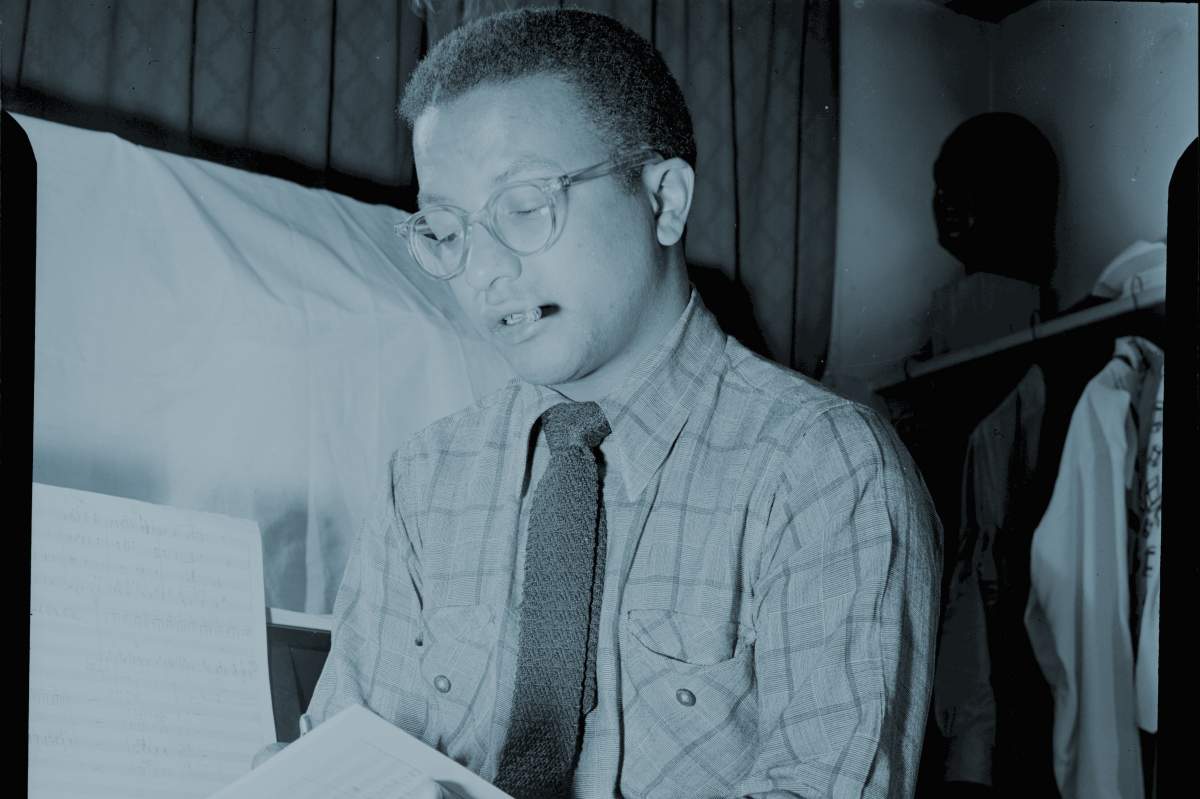
Composer, orchestrator, and trusted confidant to the great Duke Ellington, songwriter Billy Strayhorn was one of the most gifted writers in jazz history. His sophisticated style was unprecedented for its class, elegance, complexity, and sensitivity. In this hour, we'll salute the great Strayhorn by hearing many of his most well-known songs, including "Lush Life," "Take the A-Train," "Satin Doll," and "Just A-Sittin' and A-Rockin'."
[Originally aired November 27, 2015, for Strayhorn's centennial]
Ellington's Factotum
Billy Strayhorn spent most of his career under the employ of Duke Ellington, serving as his chief orchestrator and co-composer. The two met in 1938 after one of Ellington's concerts in Pittsburgh. Strayhorn was 23, Ellington by this point had already been recording for well over a decade. But the older bandleader was so impressed by the kid's talent, that he was hired on the spot.
Strayhorn's musical life began much earlier. Classically-trained from a young age, Strayhorn had a remarkably mature musical mind. By 19, he was already working on a musical, and he had several songs with lyrics already in his pocket. One such song, a song that Ellington's orchestra never recorded, was "Lush Life," a fatalist barroom lament that is wise beyond its years. The song is so emotionally and musically complex, that it's been a challenge for singers even since its publication in 1949. Frank Sinatra, who became known for emotionally wrought drinking songs, even abandoned working on it in 1958. It's one of the few songs in the Great American Songbook where the song itself is more complete, more perfect than any single interpretation, although many singers have imbued it with the necessary pathos.
Strayhorn wrote over 150 songs or other pieces of music, mostly for the Duke Ellington Orchestra. However, even if Strayhorn were only responsible for penning one song—"Take the A Train," Duke Ellington's theme—it would still put him in the history books. In 1939, Ellington had invited Strayhorn to New York. It was an early meeting for the two. Wanting to impress Ellington, Strayhorn took Ellington's directions to his place in Harlem, and spun them out into a song.
Solo Artist
While serving as Ellington's right-hand man for nearly his entire career, Strayhorn was primarily an orchestrator and composer. From the 1940s to the 1960s, Ellington's sound, including the more expansive works like Such Sweet Thunder and The Far East Suite, was largely defined by Strayhorn's pen. However, Strayhorn was a performer himself, a sensitive pianist and sometimes singer.
In 1965, Strayhorn arranged for some small group recordings that featured many players not associated with Ellington's orchestra like trumpeter Clark Terry. Singer Ozzie Bailey, who was part of Ellington's entourage, was also featured on the session, which had Strayhorn at the piano.
Blood Count
In 1964, at age 48, Billy Strayhorn was diagnosed with advanced esophageal cancer, an illness which would take his life in just 3 years. The intervening years were aggressively creative for Strayhorn. He and Duke completed and recorded their ambitious Far East Suite, Strayhorn recorded those small group sessions with Ozzie Bailey and company, which we heard from earlier this hour. He also penned the wallflower lyrics to Ellington's bluesy "Imagine My Frustration," sung by Ella Fitzgerald in 1965.
After having his esophagus removed, Strayhorn deteriorated quickly. In his final weeks, he was still able to compose, penning the aching tune "Blood Count," a testament to his pain instead of a touching goodbye. Ellington recorded "Blood Count" on his next album, a tribute to Billy Strayhorn. He died on the final day in May, 1967.
"Blood Count" has remained a standard since its tragic inception. Nearly four decades later, the song was given lyrics by none other Elvis Costello—who changed the title to "My Flame Burns Blue." Costello's new tale of longing and regret told from the perspective of a loner, all with his signature sophisticated wordplay, would have certainly made Strayhorn proud.
Pervasive Longing
If there were a word to describe any given Billy Strayhorn song, it would probably be "longing." There's a distant, yearning desire that's pervasive in all of his songs. There's no single reason for this pervasive longing: as many have speculated, like biographer David Hajdu perhaps it was because he was constantly living in the shadow of Ellington, or perhaps being openly homosexual in an era when homosexuality was being persecuted left him always wanting more out of life. Whatever the reason, this elegantly crafted longing persists in his music, and it's what distinguishes a Strayhorn song from any other in the Great American Songbook.









